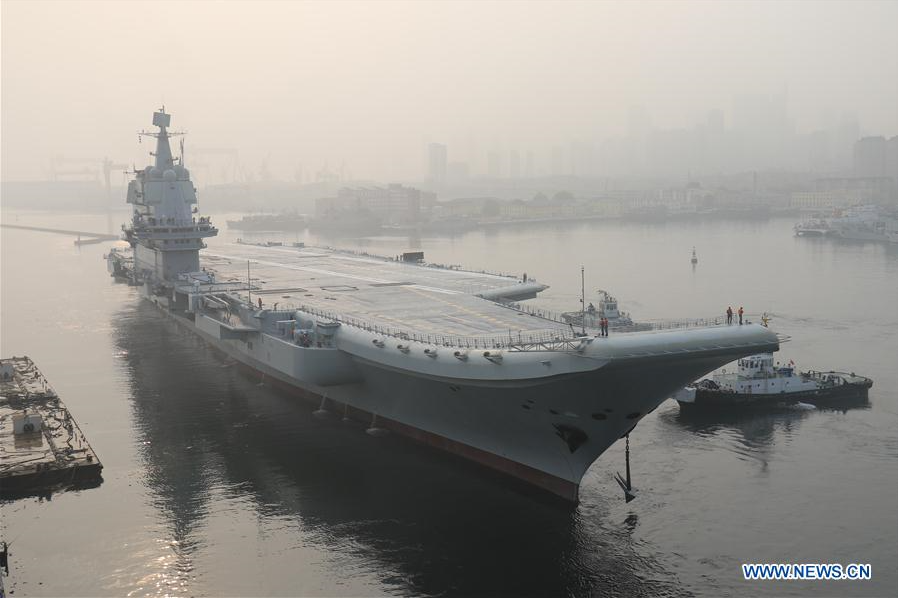China is a dangerous and complex puzzle the democratic world must deal with in the coming years. Many in the West, upon hearing Chinese officials reference a “third child,” will assume the discussion concerns Beijing’s archaic population policy. In reality, officials are using the term today to reference China’s latest accomplishment… the upcoming launch of its third modern aircraft carrier. The ship, a Type 003 carrier, is being readied for its initial launch for sea trials, possibly as soon as this weekend. As the shipbuilders in Shanghai’s Jiangnan Yard prepare for the event, military analysts in Washington note that the ship will be the most advanced produced by China and contain electromagnetic catapult aircraft launchers to provide an extended strike range for its fighter jets. China’s first two carriers employed a ”ski ramp” style launch system which limited the amount of fuel and weapons jets could carry. The US maintains a qualitative advantage over China’s large maritime fleet; however, Beijing is closing the gap. Given recent annual increases in Chinese military spending, defense analysts expect China to advance beyond the US in many areas in the next few years. While the latest carrier is good military news for Xi Jinping, not all is not going well politically for China in the Indo-Pacific region.
Earlier this week in Fiji Chinese Foreign Affairs Minister Wang Yi, and other officials from Beijing negotiating a mutual trade and security agreement with 10 Pacific Island nations, failed to secure a deal. American Military News is reporting that during the Summit China attempted to bring together the Federated States of Micronesia, the Solomon Islands, Kiribati, Samoa, Fiji, Tonga, Vanuatu, Papua New Guinea, Niue, and Timor-Leste. Wang’s goal was thwarted when the independent countries refused to join a pact that included law enforcement and fishing cooperation along with port calls for PLAN security forces and ships. The United States also is countering China’s Indo-Pacific efforts by forming its own trade and diplomatic alliances and partnerships in the region. Recently several Pacific states signed the US-led Pacific Economic Framework (PEF), including Fiji, which had hosted China for the 10-country Summit.
Further south in the Pacific puzzle, Australia is holding elections for its Prime Minister. China is closely watching those events while simultaneously trying to infiltrate and control the public discourse to direct it away from Beijing’s previous attempts to influence Australian election results. According to John Garrick of the Australian Strategic Policy Institute (ASPI), Xi Jinping is an oligarch who seeks to forcefully influence international financial, legal, and trade systems. He argues that Xi’s dream of a national rejuvenation for China extends to “exerting global leadership and shaping international institutions to better reflect China’s great-power status.” This includes a desire to control Australia’s politics and economy at every level of society.
Domestically the puzzle is no less challenging for Xi Jinping. A major cache of internal reports recently leaked from the Xinjiang Police Department reveal an inside view of the environment and scale of Beijing’s secretive campaign interning almost 2 million Uyghurs and other minorities in northwestern China. The number of files exposed is mind-boggling. There are over 300,000 verified personnel records, more than 23,000 detainee files, and 2,884 images of detainees themselves. Adrian Zenz, an international expert on internal Chinese government documents and the Xinjiang internment campaign says they were hacked directly from Chinese police databases in two ethnic minority counties in Xinjiang. Zenz says this is the first time the world has a first-hand account of police operations from police computer centers. The records include statements and speeches by the former Xinjiang Party Secretary Chen Quanguo, who talks about the oppressive attitude of the Chinese government toward the Muslim minorities located in the region. He says the camps need to be defended and explains why the government has to move against the entire population. Xi Jinping will be challenged to explain these documents to a world already reeling from event in Ukraine.
China is both a complex and dangerous puzzle that no one is close to solving. It has strengths but also pervasive weaknesses and paranoia that could be exploited by the West. It may be time for democratic nations to use those weaknesses to teach China a lesson in how to behave as a responsible member in an international rules-based system.
Daria Novak served in the U.S. State Department
Photo: Chinese aircraft carrier (China Defence Ministry)
